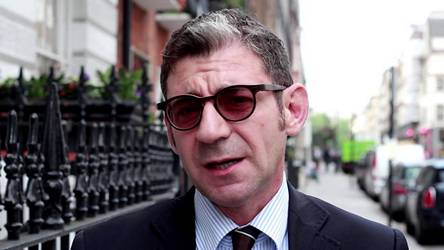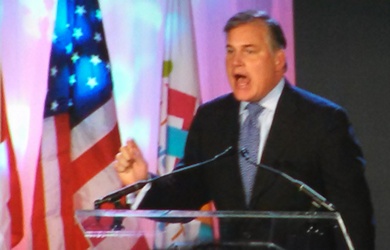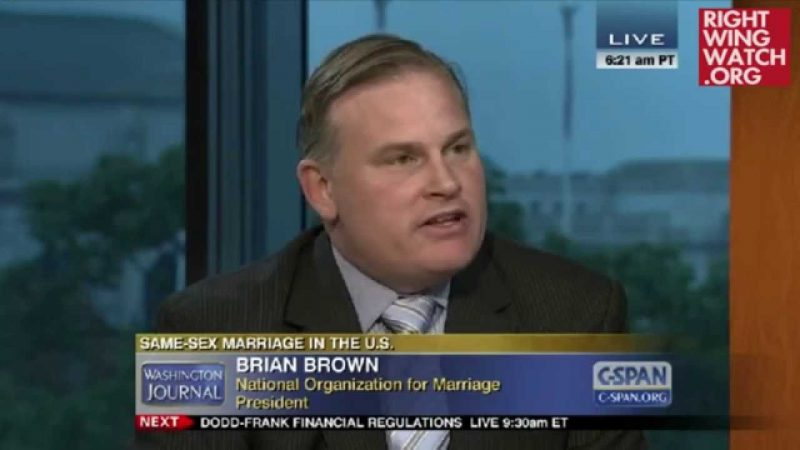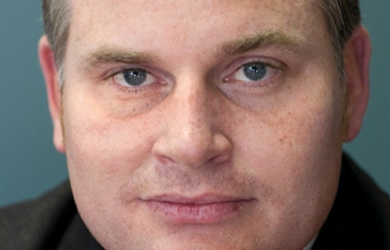The New York Times and Slate this week reported on the European far right’s love affair with Vladimir Putin, which could lead to the formation of “a pro-Russian bloc” in the European Parliament following this week’s elections.
The Times story focused on the French National Front party, and in particular Aymeric Chauprade, a top advisor to National Front leader Marine Le Pen and himself a candidate for European parliament.
Chauprade was a member of the small delegation of French activists who traveled to Moscow last year with National Organization for Marriage leader Brian Brown to advocate for Russia’s adoption of a spate of new anti-gay policies. Brown later said that he was invited to participate in the delegation by activists working with the Illinois-based World Congress of Families. The apparent leader of the delegation was French far-right activist Fabrice Sorlin, a former National Front candidate who runs an NGO devoted to developing “better relations between France and Russia” and who was appointed last year [pdf] as the World Congress of Families’ representative in France.
In a speech to fellow activists and members of Russia’s parliament at the meeting Brown attended, Chauprade backed Putin’s anti-gay policies along with the Russian president’s bid for greater geopolitical power, saying, “In this new battle…those who do not want the U.S. anti-missile shield, the dominance of NATO, or the war against Syria and Iran are in the same camp as those who refuse the loss of sovereignty, population replacement on a grand scale, FEMEN, gender theory, homosexual marriage, as well as the further commodification of the human body.”
Chauprade repeated the theme in a speech quoted by the Times, in which he offered up Russia’s leadership as the way for Europe to break free of both the “technocratic elite serving the American and European financial oligarchy” and its “enslavement by consumerist urges and sexual impulses,” and attacks Eurovision Song Contest winner Conchita Wurst. Chauprade was an enthusiastic supporter of Russia’s incursion into Ukraine, and the Times notes that he joined a pro-Russian election monitoring outfit for Crimea’s vote to annex itself to Russia. The Economist characterized the observers as “a motley group of radicals” who “declared that the ballot, denounced by most Western governments as illegitimate, had been exemplary.”
Of course, Brown doesn’t subscribe to the views of everyone he’s ever been to a meeting with. But Chauprade’s activism illuminates an important subtext of the anti-gay activism that Brown and the World Congress of Families were aiding in Russia. For Putin and his far-right European allies, opposition to gay rights is part of a much larger project.
NYT:
While the European Union has joined Washington in denouncing Russia’s annexation of Crimea and the chaos stirred by pro-Russian separatists in eastern Ukraine, Europe’s right-wing populists have been gripped by a contrarian fever of enthusiasm for Russia and its president, Vladimir V. Putin.
“Russian influence in the affairs of the far right is a phenomenon seen all over Europe,” said a study by the Political Capital Institute, a Hungarian research group. It predicted that far-right parties, “spearheaded by the French National Front,” could form a pro-Russian bloc in the European Parliament or, at the very least, amplify previously marginal pro-Russian voices.
…
Some of Russia’s European fans, particularly those with a religious bent, are attracted by Mr. Putin’s image as a muscular foe of homosexuality and decadent Western ways. Others, like Aymeric Chauprade, a foreign policy adviser to the National Front’s leader, Marine Le Pen, are motivated more by geopolitical calculations that emphasize Russia’s role as a counterweight to American power.
…
“Russia has become the hope of the world against new totalitarianism,” Mr. Chauprade, the National Front’s top European Parliament candidate for the Paris region, said in a speech to Russia’s Parliament in Moscow last year.
When Crimea held a referendum in March on whether the peninsula should secede from Ukraine and join Russia, Mr. Chauprade joined a team of election monitors organized by a pro-Russian outfit in Belgium, the Eurasian Observatory for Elections and Democracy. The team, which pronounced the referendum free and fair, also included members of Austria’s far-right Freedom Party; a Flemish nationalist group in Belgium; and the Jobbik politician in Hungary accused of spying for Russia.
…
Russia offers the prospect of a new European order free of what Mr. Chauprade, in his own speech, described as its servitude to a “technocratic elite serving the American and European financial oligarchy” and its “enslavement by consumerist urges and sexual impulses.”
The view that Europe has been cut adrift from its traditional moral moorings gained new traction this month when Conchita Wurst, a bearded Austrian drag queen, won the annual Eurovision Song Contest. Russian officials and the Russian Orthodox Church bemoaned the victory — over, among others, singing Russian twins — as evidence of Europe’s moral disarray.
At the National Front’s pre-election rally, Mr. Chauprade mocked the “bearded lady” and won loud applause with a passionate plaint that Europeans had become a rootless mass of “consumers disconnected from their natural attachments — the family, the nation and the divine.”







